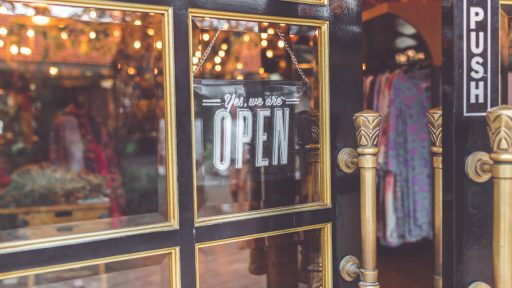- Home
- >
- Trading University
- >
- What Types of Businesses Are Considered Retail?

What Types of Businesses Are Considered Retail?

Retail businesses sell finished goods to consumers in exchange for money. As of March, 2019, total monthly retail sales were nearly $457 billion in the United States according to the U.S. Census Bureau. Retail goods can be sold through stores, kiosks, or even by mail or the Internet. Retail businesses can include grocery, drug, department and convenient stores. Service related businesses such as beauty salons and rental places are also considered retail businesses.
Grocery Stores
Grocery stores sell are variety of food and non-food products, such as meat, produce, cereal, dairy products, health and beauty aids and cleaning products. Depending on their location and the area's population, the size of a grocery store can vary from a small family market to a large supermarket. People spend a total of about $55 billion dollars per month on groceries in the United States. As of 2017, there were approximately 40,00 grocery stores in the United States. About 69 percent of these were convenient store outlets.
General Merchandise Stores
General merchandise stores include department stores and mass merchandisers, retail outlets that sell merchandise at a discount. General merchandise stores usually sell a variety of items, including clothing, sporting goods, auto parts and toys. Many department stores divvy their clothing products up by the type of customer, such as men, women, or toddlers. Including warehouse clubs, people spend an average of about $58 billion dollars a month on general merchandise as of March, 2018.
Specialty Stores
Specialty stores usually sell larger volumes of a particular type of product. Examples of specialty stores include retail businesses that sell books, women's lingerie, motorcycle parts, sporting goods, vitamins, coffee, cell phones, pet supplies or office supplies. Specialty stores are usually smaller than most traditional retail stores; and have higher costs because they operate will less volume. Consequently, prices in specialty stores are usually higher than at other retail establishments.
Non-Store Retailers
Collectively, consumers in the United States spend about $51 billion a month on products they purchase by mail, catalog or online. Non-store retailers like mail order or Internet companies are often run by entrepreneurs, and usually employ fewer people than retailers with store locations. Non-store retailers invest a significant percentage of their budget on advertising, which is their only means of attracting customers.
Restaurants
Americans spend just over $60 billion per month eating out at restaurants, including fast food, midscale, casual and fine dining establishments. Restaurants fall under "Food Services and Drinking Places," according to the U.S. Census Bureau. Hence, a portion of the $60 billion goes toward alcoholic beverages in restaurants; and in bars and nightclubs--many of which also sell food items.
Source: Chron
Picture: pexels.com
 Trader Aleksandar Kumanov
Trader Aleksandar Kumanov Read more:
If you think, we can improve that section,
please comment. Your oppinion is imortant for us.











